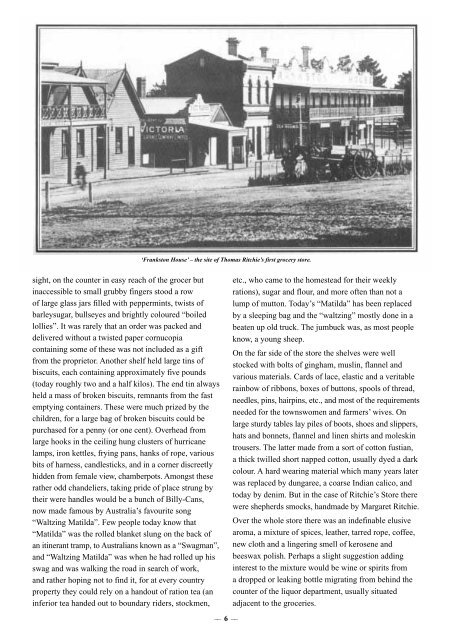THE OTHER SIDE OF THE COUNTER - Ritchies Supermarkets
THE OTHER SIDE OF THE COUNTER - Ritchies Supermarkets
THE OTHER SIDE OF THE COUNTER - Ritchies Supermarkets
Create successful ePaper yourself
Turn your PDF publications into a flip-book with our unique Google optimized e-Paper software.
sight, on the counter in easy reach of the grocer but<br />
inaccessible to small grubby fingers stood a row<br />
of large glass jars filled with peppermints, twists of<br />
barleysugar, bullseyes and brightly coloured “boiled<br />
lollies”. It was rarely that an order was packed and<br />
delivered without a twisted paper cornucopia<br />
containing some of these was not included as a gift<br />
from the proprietor. Another shelf held large tins of<br />
biscuits, each containing approximately five pounds<br />
(today roughly two and a half kilos). The end tin always<br />
held a mass of broken biscuits, remnants from the fast<br />
emptying containers. These were much prized by the<br />
children, for a large bag of broken biscuits could be<br />
purchased for a penny (or one cent). Overhead from<br />
large hooks in the ceiling hung clusters of hurricane<br />
lamps, iron kettles, frying pans, hanks of rope, various<br />
bits of harness, candlesticks, and in a corner discreetly<br />
hidden from female view, chamberpots. Amongst these<br />
rather odd chandeliers, taking pride of place strung by<br />
their were handles would be a bunch of Billy-Cans,<br />
now made famous by Australia’s favourite song<br />
“Waltzing Matilda”. Few people today know that<br />
“Matilda” was the rolled blanket slung on the back of<br />
an itinerant tramp, to Australians known as a “Swagman”,<br />
and “Waltzing Matilda” was when he had rolled up his<br />
swag and was walking the road in search of work,<br />
and rather hoping not to find it, for at every country<br />
property they could rely on a handout of ration tea (an<br />
inferior tea handed out to boundary riders, stockmen,<br />
‘Frankston House’ – the site of Thomas Ritchie’s first grocery store.<br />
–– 6 ––<br />
etc., who came to the homestead for their weekly<br />
rations), sugar and flour, and more often than not a<br />
lump of mutton. Today’s “Matilda” has been replaced<br />
by a sleeping bag and the “waltzing” mostly done in a<br />
beaten up old truck. The jumbuck was, as most people<br />
know, a young sheep.<br />
On the far side of the store the shelves were well<br />
stocked with bolts of gingham, muslin, flannel and<br />
various materials. Cards of lace, elastic and a veritable<br />
rainbow of ribbons, boxes of buttons, spools of thread,<br />
needles, pins, hairpins, etc., and most of the requirements<br />
needed for the townswomen and farmers’ wives. On<br />
large sturdy tables lay piles of boots, shoes and slippers,<br />
hats and bonnets, flannel and linen shirts and moleskin<br />
trousers. The latter made from a sort of cotton fustian,<br />
a thick twilled short napped cotton, usually dyed a dark<br />
colour. A hard wearing material which many years later<br />
was replaced by dungaree, a coarse Indian calico, and<br />
today by denim. But in the case of Ritchie’s Store there<br />
were shepherds smocks, handmade by Margaret Ritchie.<br />
Over the whole store there was an indefinable elusive<br />
aroma, a mixture of spices, leather, tarred rope, coffee,<br />
new cloth and a lingering smell of kerosene and<br />
beeswax polish. Perhaps a slight suggestion adding<br />
interest to the mixture would be wine or spirits from<br />
a dropped or leaking bottle migrating from behind the<br />
counter of the liquor department, usually situated<br />
adjacent to the groceries.


